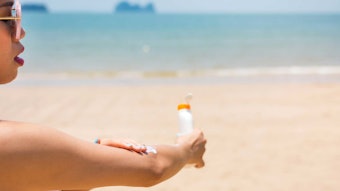
Ambiguous claims on cosmetic products appear to be a growing issue as U.S. regulations continue to allow companies to place labels related to these claims on their products. One example of this ambiguity is Big Lots' sunscreen label.
The company is currently facing a class action lawsuit over its Sound Body sunscreen that contains ingredients alleged to harm coral reefs — despite the products being advertised as “reef conscious.”
Since July 2021, Big Lots' quarterly growth has been in a downward trend, per macrotrends. Further, the company reported a loss of 28 cents per share for the 4th quarter of 2023, per Yahoo Finance.
Spencer Sheehan, attorney at Sheehan & Associates, is handling the case. Sheehan explores how misleading consumers has been an everlasting issue and shares how these claims are dangerous for buyers.
Related: Are Reef Safe Claims a Gimmick? Big Lots Sunscreen Lawsuit, Hawaii Ingredient Bans, TikTok Misinformation
C&T: Is using claims on products without concrete definitions misleading to consumers?
Sheehan: The FTC — the government agency that is tasked with ensuring a fair marketplace for the public — has said numerous times over the hundred years or so that it has been in existence that companies should not make claims for which they don't have factual support. This is something, unfortunately, that continues to be an issue, not just in respect to cosmetics and personal care products but a variety of products and services sold to consumers.
C&T: Where does that issue stem from?
Sheehan: The issue is as old as humanity itself, which is to try to make money and to try to make more money from consumers at the benefit of their pocketbooks and at the same time to put more money in the pockets of big corporations. Not all this is necessarily motivated by malicious reasons, sometimes perhaps there may be good reasons why a company may use a particular claim on a product or service, but for the most part, it’s because companies know that what they say about their products and services matters to consumers because if it didn't matter they wouldn't spend hundreds of billions of dollars in advertising in order to convince the public that their product is superior to competitors.
C&T: Explain the Big Lots Case.
Sheehan: I think the natural interpretation of [reef-conscious] by consumers is that not only will the sunscreen not be harmful to reefs, it will in fact be helpful or otherwise positive — have positive effects. More and more we are aware, or we see every day of the environmental harms caused to society. Much of it from consumer products. Whether it's single-use plastics, of which there’s a global crisis. We don’t need to look too far to see the impact of that, whether it’s pollution, whether it's the health harms of microplastics in so much of the food and beverages and even in our water supply resulting in contamination and the effects on our natural environment, especially the incredibly valuable and critical reef ecosystems which are home to so much of the planet’s marine diversity.
C&T: What are the dangers of using claims like "reef-conscious" and "reef-safe?"
Sheehan: The danger — the immediate harm is that consumers are misled to buy something that’s not what it claims, but more significantly and obviously is that such products are indeed harmful to reef ecosystems, are not reef safe and most significantly it causes the public to think that what they’re doing is indeed helpful and to preserve these incredible ecosystems and to not take actions that might actually be helpful, like for instance using sunscreens that some say are based on minerals that are not chemical based.
By telling people that a sunscreen is reef friendly, reef safe, reef conscious, you’re telling people that they don’t need to explore alternatives to what they’re doing. It’s those alternatives — those significant changes — which you know is what we really need in order to make the types of environmental choices and decisions that not just stabilize and limit the harm that we cause to our environment on a daily basis, but also to reverse it and to give these ecosystems some breathing room so that they are able to recover and flourish and support our society for hundreds and thousands of years in the future.
C&T: How do U.S. regulations protect consumers from company products with ambiguous claims?
Sheehan: Unfortunately, there’s very little in the way of regulations about many of the types of claims that companies use on their products. There are regulations for certain things, for instance SPF numbers or whether or not you have to apply this sunscreen multiple times in terms of disclosing what are the active ingredients on sunscreens. Those are things that regulations require to be disclosed, however, this type of information isn't often what is most important to the public.
What's most important is what the public can understand and in this context the absence of any regulations about so much of what is used to market consumer products is not regulated and that gives companies the chance to step in and really push the boundaries about what's acceptable. Very rarely will a federal agency or a state agency — whether in the form of a stature attorney general or Food and Drug Administration — very rarely will they step in and stop these. So the market is left unchecked and, not to praise myself, but that’s the role of attorneys who practice on behalf of consumers and the public to try to force a level of fairness, transparency and honesty to what companies are telling the public about what they’re buying.
C&T: Do you believe U.S. regulations are outdated?
Sheehan: Yes, they are outdated, and I think there definitely needs to be a renewed focus on making sure that companies are being truthful and also, to the best extent possible, any regulations that may be enacted, any laws that may be passed. Unfortunately this is a constant – it's a treadmill of having to keep up with the latest science and the latest trends, because while regulations will help to a point, there’s always going to be something new, something that the regulations don’t touch and that's what companies spend billions of dollars a year to figure out, and they’re staying ahead of the government. The government will always be a little bit behind private industry in terms of the next big thing.
We can regulate about things that have already happened and may be going on, but in terms of what the future holds it's a constant challenge and that's why we rely on companies to do the right thing and for the most part most [they] do, I will say that other countries have not only more robust government regulations such as Canada and countries of the European Union, but I think also there’s more of a sense of self-regulation because those companies operating in those countries know that if they step out of line and if they go too far then the relevant enforcement agencies will come down on them for it and be pretty direct in terms of composing whatever sanctions they might feel appropriate to protect their public.
Editor's note: As of July 1, 2024, deadlines regrading the Modernization of Cosmetic Regulations Act (MoCRA) will be in effect. This act provides the FDA with significantly more authority in terms of enforcement for products violating FDA standards.










